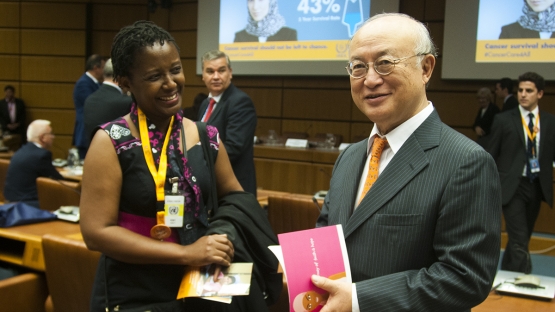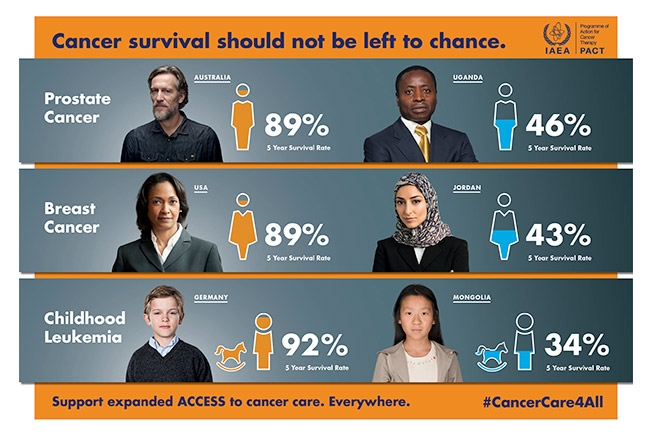The IAEA can play an important role in assisting countries to meet an ambitious new target of reducing cancer-related deaths by a third in the next 15 years, Director General Yukiya Amano said in a panel discussion on global cancer control at IAEA headquarters. “Improving cancer control in developing countries continues to be a priority for the IAEA and for me,” he said. “The IAEA has the technology and the expertise to help developing countries in building capacity to reduce their cancer burden.” The event ‘The Future We Want: Comprehensive Cancer Care in the Post-2015 Agenda’ was held during the IAEA General Conference on Wednesday.
Through its technical cooperation and human health programmes, the IAEA “has a long history of supporting Member States in developing the capacity and infrastructure for cancer control. Through our Programme of Action for Cancer Therapy (PACT), we will continue to play an essential role,” he added.
With world leaders expected to adopt the “2030 Agenda for Sustainable Development” at the end of September in New York, the international community is committing to a new set of ambitious development targets, called the Sustainable Development Goals (SDGS).
One of the key issues expected to be addressed in the new development agenda is the growing global burden of non-communicable diseases, in particular of cancer, which has become a leading cause of death and disability in low- and middle-income countries. With more people across the world developing cancer than ever before, and with over two-thirds of all cancer-related deaths occurring in developing countries, urgent collective and scaled-up action is required.
Mr Amano encouraged Member States to do more to raise international awareness of how serious the cancer problem is.
“Louder voices are needed to ensure funding organisations can prioritize resources for cancer,” he said. “We need to hear from your Presidents and Ministers that cancer is an obstacle, and that there is an unfairness and an economic issue that needs to be addressed. To achieve this goal, we need to deliver more concrete results. I am very happy to support this with the help of our Member States.”
Access to treatment
“The international community will look to the IAEA for support in meeting the emerging global target,” said Mary Whelan, Ambassador of Ireland to the IAEA. Ireland co-chaired the intergovernmental negotiations of the final SDG document. Ambassador Whelan noted the great contribution of the IAEA in helping countries to achieve the SDGs. “With its long history of working for peaceful applications of nuclear technologies, the IAEA is well placed to take a key role in guiding and supporting its Member States to a healthy and productive future, including in the fight against cancer,” she said.
Universal access is key to the achievement of the new target, said Juan Elias Chebly, coordinator of the ‘World We Want 2015’ global discussion by the UN Secretariat, which collects input from around the world on the new development agenda. “Health is of key importance to the youth of the world. There is a great desire to ensure that current and future generations have expanded access to comprehensive health care services, with a strong focus on delivering on non-communicable diseases and on cancer.”
With its long history of working for peaceful applications of nuclear technologies, the IAEA is well placed to take a key role in guiding and supporting its Member States to a healthy and productive future, including in the fight against cancer.



